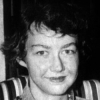Flannery O'Connor

Flannery O'Connor
Mary Flannery O'Connorwas an American writer and essayist. An important voice in American literature, she wrote two novels and 32 short stories, as well as a number of reviews and commentaries. She was a Southern writer who often wrote in a Southern Gothic style and relied heavily on regional settings and grotesque characters. Her writing also reflected her own Roman Catholic faith and frequently examined questions of morality and ethics. Her posthumously-compiled Complete Stories won the 1972 U.S. National Book...
NationalityAmerican
ProfessionNovelist
Date of Birth25 March 1925
CitySavannah, GA
CountryUnited States of America
... the main concern of the fiction writer is with mystery as it is incarnated in human life.
To expect too much is to have a sentimental view of life and this is a softness that ends in bitterness.
Accepting oneself does not preclude an attempt to become better.
She would of been a good woman," said The Misfit, "if it had been somebody there to shoot her every minute of her life.
Writing a novel is a terrible experience, during which the hair often falls out and the teeth decay. I'm always irritated by people who imply that writing fiction is an escape from reality. It is a plunge into reality and it's very shocking to the system.
I doubt if the texture of Southern life is any more grotesque than that of the rest of the nation, but it does seem evident that the Southern writer is particularly adept at recognizing the grotesque; and to recognize the grotesque, you have to have some notion of what is not grotesque and why.
Southern culture has fostered a type of imagination that has been influenced by Christianity of a not too unorthodox kind and by a strong devotion to the Bible, which has kept our minds attached to the concrete and the living symbol.
When there is a tendency to compartmentalize the spiritual and make it resident in a certain type of life only, the spiritual is apt gradually to be lost.
The truth does not change according to our ability to stomach it.
The two worst sins of bad taste in fiction are pornography and sentimentality. One is too much sex and the other too much sentiment.
Go warn the children of God of the terrible speed of mercy,
Even in the life of a Christian, faith rises and falls like the tides of an invisible sea. It's there, even when he can't see it or feel it, if he wants it to be there. You realize, I think, that it is more valuable, more mysterious, altogether more immense than anything you can learn or decide upon It will keep you free - not free to do anything you please, but free to be formed by something larger than your own intellect or the intellects around you.
I feel that discussing story-writing in terms of plot, character, and theme is like trying to describe the expression on a face by saying where the eyes, nose, and mouth are.
It is popular to believe that in order to see clearly one must believe nothing. This may work well enough if you are observing cells under a microscope. It will not work if you are writing fiction. For the fiction writer, to believe nothing is to see nothing.